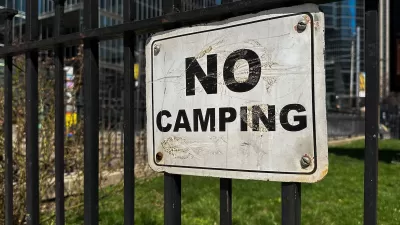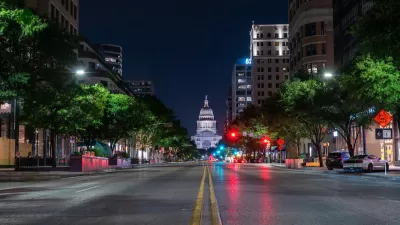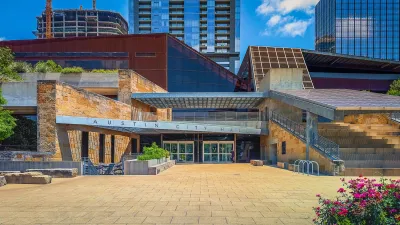The Texas capital is struggling to house its unsheltered residents even as the city commits more resources to building and acquiring more affordable housing units.

After the city reinstated a voter-supported public camping ban in May 2021, homelessness in Austin has gone up by around 20 percent, reports Lucy Tompkins in an article originally published in The Texas Tribune and republished by Next City.
As Tomkins notes, the city is making some efforts to address the affordable housing crisis. “The city has converted two former hotels into shelters that can house up to 130 people as encampments are cleared and has plans to add more than 1,000 more housing units in the next two years.” However, the slow pace of progress means many Austin residents still find themselves on the street, “shuffled from place to place” by police.
The ban on public sleeping comes after the same restriction was rescinded three years ago, but public outcry led to its reinstatement last year. “A political action committee called Save Austin Now gathered enough signatures to put a camping ban on the ballot, which Austin voters overwhelmingly approved by a 57% to 42% margin.” According to Tomkins, “The following month, Abbott also signed into law a statewide camping ban passed by the Legislature, with penalties for any city that failed to enforce it.”
Tomkins profiles Lt. Lawrence Davis, the police lieutenant tasked with leading the camping ban enforcement. Davis struggled with how to approach people in violation of the ban. “If we’re going to tell people to leave, then it just seemed reasonable that we should be able to tell people where to go,” said Davis, echoing the problem facing other cities. In 2017, Houston was forced to stop enforcing that city’s camping ban after a federal judge ruled that “enforcing the ordinance when people had nowhere else to go would violate their Eighth Amendment right to be free from cruel and unusual punishment.” Since then, the city has redoubled its efforts to end chronic homelessness.
The article outlines Austin’s inadequate housing programs, pointing out that “most people living on the street or in shelters have already been assessed for housing and are on a waiting list that averages about eight months.” Plans are in the works to create housing for an additional 3,000 people by the end of 2024 using American Rescue Plan Act funding, among other sources.
FULL STORY: Austin Struggles To House Its Homeless After Voters Restored Camping Ban

Trump Administration Could Effectively End Housing Voucher Program
Federal officials are eyeing major cuts to the Section 8 program that helps millions of low-income households pay rent.

Planetizen Federal Action Tracker
A weekly monitor of how Trump’s orders and actions are impacting planners and planning in America.

Ken Jennings Launches Transit Web Series
The Jeopardy champ wants you to ride public transit.

California Invests Additional $5M in Electric School Buses
The state wants to electrify all of its school bus fleets by 2035.

Austin Launches $2M Homelessness Prevention Fund
A new grant program from the city’s Homeless Strategy Office will fund rental assistance and supportive services.

Alabama School Forestry Initiative Brings Trees to Schoolyards
Trees can improve physical and mental health for students and commnity members.
Urban Design for Planners 1: Software Tools
This six-course series explores essential urban design concepts using open source software and equips planners with the tools they need to participate fully in the urban design process.
Planning for Universal Design
Learn the tools for implementing Universal Design in planning regulations.
Ada County Highway District
Clanton & Associates, Inc.
Jessamine County Fiscal Court
Institute for Housing and Urban Development Studies (IHS)
City of Grandview
Harvard GSD Executive Education
Toledo-Lucas County Plan Commissions
Salt Lake City
NYU Wagner Graduate School of Public Service





























